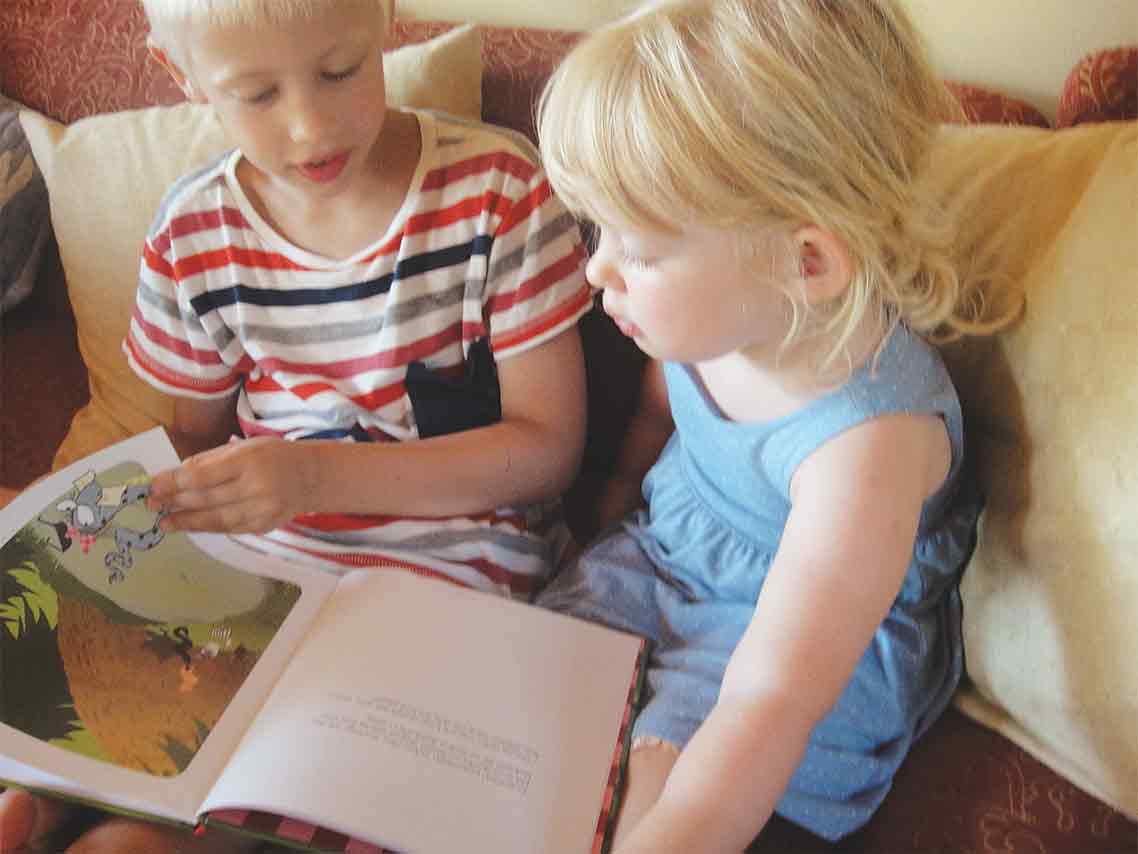Language development
4 to 6 years

Language development4-5 years
At this age, children’s language often becomes more and more adult-like, and finer details start to fall into place. They can tell more complex stories, use longer sentences, and often conjugate words correctly. Some irregular verb forms may still be challenging. For example, children may say “goed” instead of “went”. It is also common for children to struggle with the pronunciation of certain speech sounds. The sounds of “r” and “sh”, for instance, often don’t fully develop until later in school age.
Tips!
A tip when a child says something that is not quite right, like “he goed to the slide”, is to provide the correct version and expand upon it. For example, say, “Yes, he went over to the slide. What is he doing over there?”
Children’s interest in numbers and letters usually emerges, and if a child is struggling with the pronunciation of certain speech sounds, we can often incorporate it into play with sounds. Sometimes children may not fully grasp the distinction between “k” and “t” sounds, for example, and it becomes clearer when looking at letters together and trying to come up with words that start with either sound.
Children’s understanding and use of more complex concepts also tend to develop. It can involve comparing things, identifying what is “bigger” or “smaller”, “similar” or “different”.
Tips!
Think of yourself as feeding your child with new words. Abstract concepts are often easier for children to understand if we try to make them as concrete as possible. We can show, draw, or conduct small experiments together, such as having children feel something “heavy” and something “light” while discussing the words.
Children at this age also start to have a little easier time empathizing with how others feel and think, and they understand that not everyone thinks exactly like they do. This can make cooperation and compromise easier, although it can still be challenging for children to not get what they want, and our empathy is something that can develop throughout life.
Tips!
One tip is to take the time to put feelings into words, both for children and others. If there has been a conflict over something, you can talk through what happened during a calm moment and maybe brainstorm together what to do differently if the situation arises again.
Language development5-6 years
Now it’s almost time for school! Children’s thinking develops, and they become better at drawing conclusions and understanding contexts. They continue to learn a lot through play but are also usually able to sit still and concentrate for a while on different tasks.
Something that is beneficial for later reading and writing development is to play with language together. We can rhyme and recite nursery rhymes, talk about how words sound, and listen for the sounds in words. This builds up linguistic awareness, which is the ability to look at language from a slightly external perspective.
Tips!
Read ABC books and take the opportunity to introduce how the letter sounds. The letters have both sounds and names. “M” is called “em” but sounds like “mmm,” and it’s actually the sound “mmm” that the child needs to start blending words together.
Some individual speech sounds may still be challenging for the child to pronounce. For example, around 20% of five-year-olds still struggle with the “r” sound. The child may also make mistakes with some uncommon endings, but generally, their sentences are grammatically correct.
Children often begin to learn more things by heart and may be interested in facts about different things. Take advantage of their curiosity, find out more information, explain at the child’s level, and seize the opportunity to expand their vocabulary.
In the 6-year-old age range, a child’s vocabulary can contain between 10,000 and 15,000 words, and the more we read and talk with the child, the more words they will learn.
Tips!
Pick up on unusual and complex words, for example, when reading books, and take the opportunity to explain and discuss their meanings.
Explaining and telling about more complex things can still be challenging for the child, but we can facilitate it by listening attentively, giving the child time, and assisting by asking supportive questions. For example, “Where did this happen?” or “What happened next?”
Creating our own stories together can also be a fun way to support the child’s development of storytelling.
At this age, friends are often important, and children may begin to compare themselves more with others. It can become more challenging for them not to know things, and it is good for us to support them in that. We can talk about how everyone has things they find difficult and encourage children to try again.
Tips!
Continue talking about feelings with the child, both their own and others’. Being able to put words to feelings facilitates interaction with friends and others.
